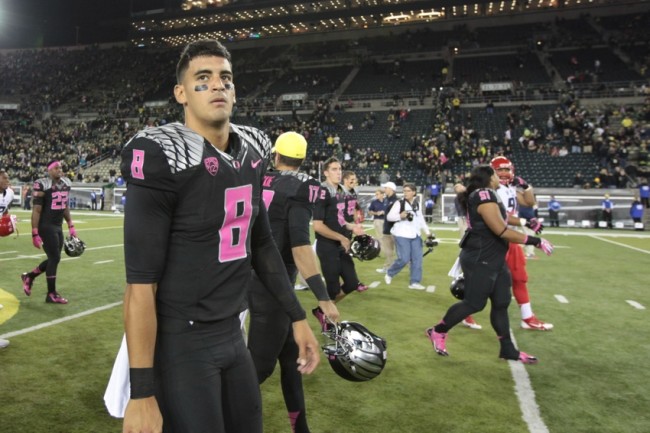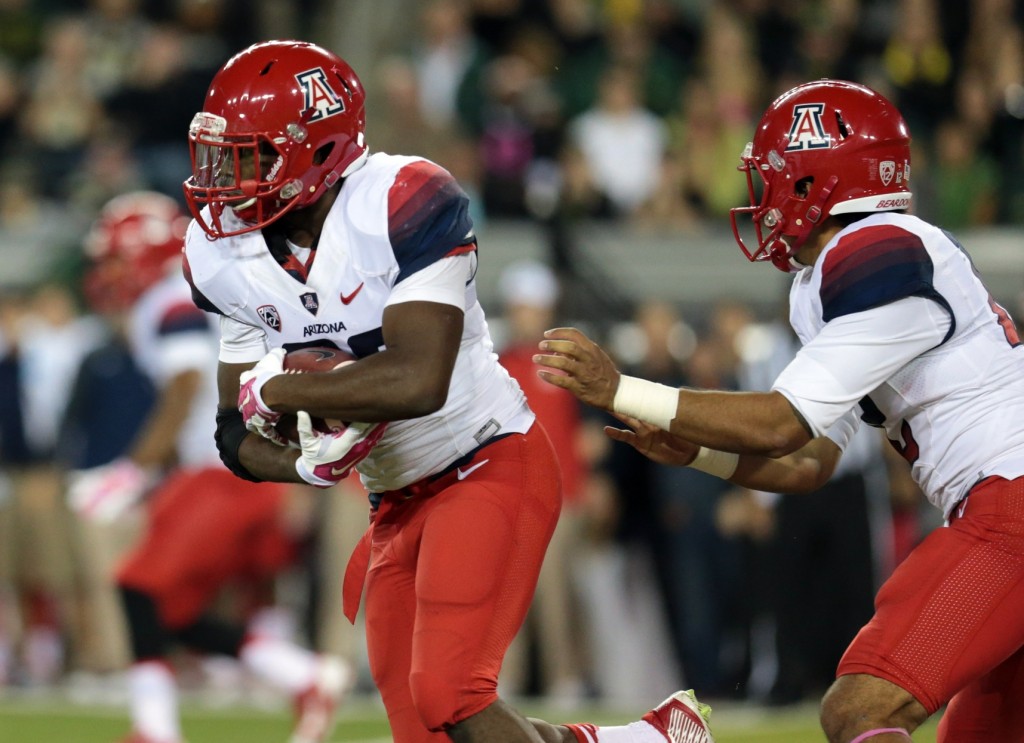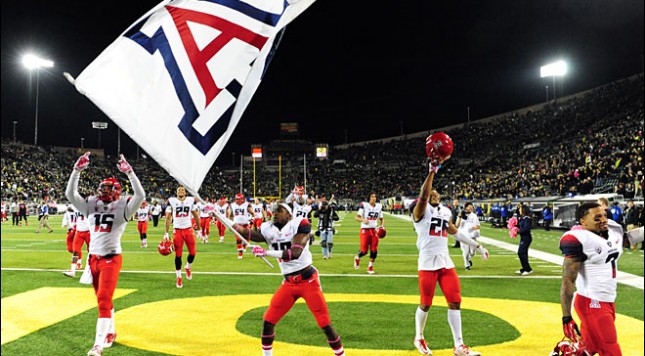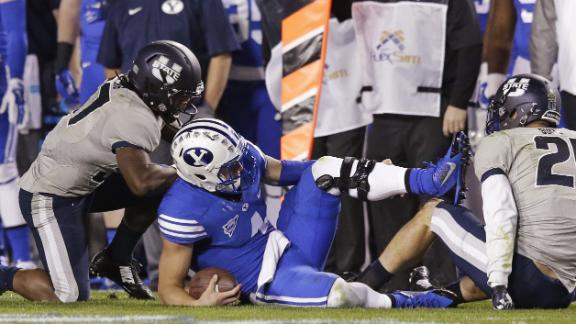So, that was some kinda weekend, wasn’t it?
You might think there are no truly original movie concepts left to explore, but the notion of praising Arizona is pretty new to anyone who has chronicled college football for any appreciable length of time. That’s how crazy the past weekend was… and Arizona’s upset of Oregon wasn’t even on the Saturday which shook up the landscape to such a pronounced extent.
There’s a lot to break down, which means we need three voices, not just one, to give you a fuller view of the national picture in college football. So many moving parts need to be accounted for, and so many changing equations need to be monitored. You’ll find plenty of topics and tension points discussed below. Feel free to engage each of us on Twitter, including at our site’s account, @TheStudentSect.
*
Question No. 1: Put on your news analyst’s cap — of all the major results from the past weekend, which one means the most in the present tense, and which one is the most likely to resonate through the rest of the season on an appreciably powerful level?
Terry Johnson:
On Twitter: @SectionTPJ
If I’ve learned anything from the past weekend, it’s that “it’s not over until it’s over.”
No, I am not talking about the chaotic finish between Arizona State and USC (what is it with team from the Grand Canyon State and Hail Mary passes at the end of a game?). Rather, I came to the conclusion that I won’t know which four teams are going to play in the College Football Playoff until every game is in the books.
And even then, it could be too close to call.
Let’s be honest, this weekend’s action drove home the point that there are a lot of extremely talented squads out there. Ole Miss, Mississippi State, Arizona, and TCU all proved that they can beat any team in the nation by recording an upset over a top six opponent. Likewise, Georgia Tech (tie for first place) and Kentucky (tie for second) vaulted to the top tier of their respective divisions by beating teams they almost always lose to. Add in the fact that a total of 11 teams in the AP top 25 lost last week, and it’s safe to conclude that there’s plenty of parity in college football this season.
Of course, more parity means that there are plenty of potential upsets brewing every weekend. This leaves plenty of opportunity for teams like Alabama, Oregon, Oklahoma, and UCLA to get back in the race as long as they win out.
Will it happen?
It’s tough to say. After what transpired on the gridiron last weekend, I wouldn’t be surprised to see a two-loss team in the College Football Playoff.

While Arizona is rightly and richly praised for what it achieved last Thursday, don’t forget that Oregon, under Mark Helfrich, continues to fail to live up to the standards set by Chip Kelly. There’s a case to be made that Oregon still controls its fate as far as the College Football Playoff is concerned, and that’s quite accurate. Yet, let’s briefly present the other side of the argument, the more pessimistic one: Marcus Mariota was supposed to enable Oregon to rise above the rest of a Pac-12 with a regrouping Stanford team that has already lost twice this season, and a Pac-12 South which lacks a USC-like colossus from the Pete Carroll era. The fact that Oregon now has a much smaller margin for error in the race for a College Football Playoff spot means that both Helfrich and Mariota will be shouldering a huge amount of pressure for the rest of this season. If Oregon comes up short in 2014, where will the program be when Mariota departs? It’s not overstating the matter to say that Oregon is on the verge of a crisis point. The Ducks aren’t there yet, but they’re uncomfortably close following the loss to Arizona.
Bart Doan:
On Twitter: @TheCoachBart
Does the “analyst cap” look anything like the old Greg Norman Shark straw hat, because if so, I’m in. Also, if it can come with a bottle of his merlot, I’m in even more. I’m going to cop out on the term “weekend” and say that Thursday’s duck hunt by Arizona is the one we’re most likely to be dealing with for a few months.
While it’s become commonplace for Oregon to lay one stinker in the regular season when you just expect them to buzz saw everyone and do it with flash. Arizona seems to have their number these days, however.
While we’re accustomed to having the “can Oregon beat a pro-style power offense” schtick every year, Arizona is decidedly not that team, but still gives the Ducks fits and has for some time. The reason that it will be a game we’re dealing with down the road in college football life is that in America’s deepest conference, the lone unbeaten is Arizona, and that by default puts the Wildcats in the CFB Playoff hunt.
The other reason is that if Oregon runs the table, the Ducks are still probably getting into the playoff. The Pac-12 is finally getting the respect it deserves, and this could end up being a rematch in all honesty if Arizona can stay the course and not let wounded Arizona State or “something is just off with them” UCLA lap the Cats in the standings. At that point, it’d likely be a “winner goes to the playoffs” type of tilt. There’s a long way to go until then, but these are the breaks.
Matt Zemek:
On Twitter: @SectionMZ
It was one of the most mysterious movements of the offseason: the movement of the pundit class in college football in the direction of the UCLA Bruins as a foremost playoff contender. Other than Brett Hundley and Myles Jack, exactly what suggested that UCLA was ready to make a breakthrough in the Pac-12?
UCLA is a program that — psychologically — never really recovered from losing that postponed game in the Orange Bowl stadium against Miami at the end of the 1998 regular season. It’s fascinating that programs do acquire real human personalities; this is one of the most confounding yet engrossing aspects of covering this sport over time… and it definitely applies to UCLA, which has been paralyzed by a crisis of confidence for a decade and a half. What Terry Donahue built, and what Bob Toledo came oh-so-close to sustaining for the long haul, has simply not re-emerged ever since.
What’s important to mention is that USC is now in a period of drift itself. The Trojans’ hold on power in the West was broken as soon as:
- the 2008 season ended;
- Jim Harbaugh built Stanford up to a point where it could clobber (not merely beat) the Trojans;
- Chip Kelly found his footing in Eugene;
- the NCAA did its thing.
It’s instructive to point out that with USC no longer in the ascendancy, UCLA has not been able to take advantage — not fully, at any rate. The Bruins did make the 2012 Pac-12 Championship Game (we’re not going to treat the 2011 game as an achievement, given the circumstances), but that’s about it. There’s been no indication that the Bruins were a colossus in the making; the program that could be counted on in the Donahue days has been — like Pac-12 South neighbors Arizona State and Arizona — a true “almost program” in college football, with the end of 1998 marking the beginning of that long dry spell and an identity that had been removed when Donahue prowled the sidelines.
That identity — of teasing a fan base with the promise of potential but then falling short in circumstances when it shouldn’t — was powerfully reaffirmed on Saturday night at home against a Utah team that squandered a 21-point home lead to Washington State (you know, the team that gave up 60 to California and also scored just 13 points against the Nevada squad which just conceded 51 to Boise State) the week before.
LeBron James might have noticed that Hundley got sacked not one, not two, not three; not four, not five, not six… but TEN TIMES by the Ute Movement on Saturday.
Some pundits — they know who they are — were so intent on mapping out the path for UCLA to get to the College Football Playoff in September. That path could still allow for another loss, to be honest, because as Terry accurately notes above, there’s a very realistic chance that the playoff will have at least one two-loss team. Yet, can you see UCLA making its way safely through the rest of the season with THAT offensive line?
The Bruins will have to play a number of teams better than Utah.
Stanford might sack Hundley 20 times on Thanksgiving Friday.
You get the point: It is…
Utterly
Clear in
Los
Angeles
… that the Bruins are not ready for prime time.
*
Question No. 2: Northwestern, Arizona, and Georgia Tech all have realistic chances of winning their respective divisions, and Memphis has a chance to win The American. Which team stands out to you the most, either as a team that looks like the real deal or a team that’s likely to be exposed in the next two months?

Among the teams that have unexpectedly risen to the top of a division or conference through week six, Arizona — in the Pac-12 South — seems to have more staying power while accomplishing more to attain its presently lofty perch. Keep this in mind about Arizona football, though: This is the only member of the original Pac-10 (it joined what had been the Pacific-8 in 1978) to have never made the Rose Bowl. Novembers and late Octobers have crushed this school in the past. If Rich Rodriguez can win a Pac-12 title, his reputation in the coaching community will be forever transformed. Arizona is certainly a program to watch over the next few weeks, as it tries to shed a history of almost unceasing misery.
Bart Doan:
Apparently this is going to be the all-Arizona roundtable for me. Northwestern is what it is … a flawed team that struggled badly out of conference and has found new life in a Big Ten West more watered down than a silo full of Bud Select.
Georgia Tech needed a hero’s comeback to beat Georgia Southern. Memphis is a non factor in the grand scheme of college football since the American Conference has been banished to non-Power 5 hell. It’s a good story, but the Tigers have already lost to UCLA and Ole Miss, albeit with a major fight in both.
Arizona, on the other hand, should have people turning their heads and saying, “hey, maybe …” about their chances to be a factor in the playoff race, and that’s really what this is all about. I know, I know, the Wildcats needed a Hail Mary to defeat Cal.
You know what? I don’t really care. Wins are wins, which are better than losses no matter how you go about snaring them. The win over Oregon at the Ducks’ joint (pun intended) should erase any concerns that they should be banished to “opinion hell” over beating a much-improved Cal team at the horn, miracle style.
On top of that, Anu Solomon looks like your de facto surprise freshman Heisman candidate, and that has powerful national legs in the sense that if he’s breaking through the radar, Solomon is successfully swimming against the tide. Simply put, if the guy’s playing for someone in the Eastern or Central time zone, he’s all anyone’s talking about this week and will need some terrible nickname from increasingly bad college football media.
Matt Zemek:
What’s one of the basic pillars of sports analysis, in college football or anywhere else? You need to be able to determine if outcomes are “won by the winner” or “lost by the loser.” It’s just a fact of life that as much as certain teams, programs, or fan bases desperately want to believe that their ascendancy is solely because of their own excellence, said ascendancy is often the product of the weaknesses of their victims.
For Georgia Tech, such is the case through week six.
No sane Yellow Jacket fan can deny that the implosion of Virginia Tech quarterback Michael Brewer gave the Ramblin’ Wreck the timely forward push it needed in Blacksburg a few weeks ago. No Georgia Tech fan can deny that Al Golden looks out of his league in Miami, especially away from home, and that the Hurricanes are — with Florida State on the schedule and the Louisville loss also on the ledger sheet — this close to being done in the ACC Coastal, with most of the schedule still lying ahead. The ACC Coastal has not improved this season… not with Larry Fedora looking lost in Chapel Hill; not with Virginia Tech failing to build on its win over Ohio State (and doing the exact opposite of building, in fact, ever since that moment).
Let’s give Georgia Tech a ton of credit for being resilient in the face of in-game adversity against Virginia Tech. Let’s also credit Paul Johnson for outcoaching Golden in a big way this past Saturday, giving The U a bunch of looks its staff hadn’t seen before. Johnson entered this season needing to quell the discontent which pervaded his program’s fan base. Going 2-0 against the Hokies and Hurricanes for the first time in Atlanta offers a pretty good way of doing just that, so it’s not as though Georgia Tech doesn’t deserve a large share of credit for its accomplishments thus far.
Pardon me, though, if all this means the program is somehow “back.” For one thing, the Jackets have to take care of Duke this week. Second, let’s see how Georgia Tech handles future road games. Third, if the Jackets make the ACC Championship Game and face Florida State, can they rightly claim to have belonged on the same field after 60 against the Seminoles?
This program has done a lot in six weeks, but there’s still so much more to prove before that B-word (not “BEEEEEEES” — I’m referring to the word “BACK”) can be truly unsheathed.
Terry Johnson:
Make no mistake about it: Northwestern will be exposed over the next two weeks (even though an early season loss to Northern Illinois has already done that). Yes, the Wildcats upset Wisconsin last week, but they only did so because the Badgers kept turning the ball over. The NU defense had absolutely no answers for Melvin Gordon, who shredded the Wildcats for 259 yards on 27 carries.
That will ultimately spell doom for Pat Fitzgerald’s team in its next two contests. Minnesota (24th) and Nebraska (8th) have ground games that are every bit as impressive as Wisconsin’s, which should result in a ton of rushing yards. Yet, unlike Wisconsin, both teams do an excellent job of protecting the football, especially the Gophers, who rank 11th nationally in turnover margin.
On the other hand, Arizona is the real deal. While a lot of people will claim they’re not a legitimate contender because of some sub-par performances in the non-conference portion of the schedule, the Wildcats have earned their stripes in Pac-12 play. Sure, there was some luck involved with the Hail Mary pass to beat Pac-12 North leader Cal, but the bottom line is that Arizona scored five times in the final stanza just to get into that position. The ‘Cats followed that up with a road win against Oregon, their second win over the Ducks in as many seasons.
There’s no way to accomplish those feats and not be seen as formidable.
Or, as Bobby Bowden once said, “If we haven’t lost any games yet, you can’t say that we don’t have a doggone football team.”
*
Question No. 3: BYU’s loss to Utah State pretty much guarantees that the Cougars will play in the Miami Beach Bowl this season. Does that reality mean the Cougars’ independent status is not serving the program well, and that the school should seek to join The American?
Matt Zemek:
Here’s my question for BYU in terms of playing in The American and securing eligibility for the “Gang Of Five” (the five conferences that stand on the other side of the Power 5 in the bowl world):
If you want to pursue Big 12 membership (we know the Pac-12 just doesn’t want BYU, which is unfortunate; the school would still be a natural fit there), just why is it that your national schedule as an independent includes games against Houston and — this week — UCF, both on Thursdays? Moreover, this Thursday game follows a Friday game the previous week, creating a short week.
If the travel schedule is a grind in the present tense as an independent, the notion of flying across the country (this UCF game is in Orlando) shouldn’t be too much worse as a member of The American for football alone. (The program would stay in the West Coast Conference for hoops.) BYU could still schedule on a national level in its four non-conference games and gain more access to a premium bowl.
Let’s just acknowledge what everyone else knows: BYU won’t be accorded the same independent status as Notre Dame unless or until it can crank out an unbeaten season or an 11-1 season against a more impressive schedule (such as last year’s much tougher slate, as opposed to this year’s). Maybe BYU should wait a few more years to get a fuller feel for what is and isn’t possible as an independent, so that life in such a condition is fully tested and tried — fair enough. However, how many more years (beyond two or three) does BYU really want to languish in college football limbo? If parity with Notre Dame is going to be this elusive, gaining Gang Of Five bowl eligibility is going to look more attractive in 2017 or thereabouts.
Perhaps BYU is waiting for the day when the playoff moves to eight teams. That could offer a reason for standing pat.
At any rate, in light of the loss to Utah State and the death of a dream it represented, BYU should be freshly evaluating its situation. Maybe this process of evaluation won’t lead to a change of mind, but these interconnected issues definitely merit a new appraisal.
Terry Johnson:
My answer has two parts.
If the question is “Should BYU join the American Conference?”, the answer is “Absolutely not.” The school would be entirely foolish to join the watered down version of the Big East. Even if all the teams in the AAC were as good as UCF, East Carolina, Cincinnati, and Memphis, BYU still wouldn’t get to play for the national championship since it wouldn’t be in one of the Power 5 conferences.
Without a chance to earn its way into the College Football Playoff, why would the Cougars want to fly two time zones away for games against lightly regarded opponents like Temple and UConn? The school would actually lose money on those trips.
Now, if the question is “Should BYU join the Big 12?”, then the answer is “Sign the papers, ASAP!” Sure, geography might still be a problem, but playing a power conference would give the Cougars a chance at a better bowl game and an opportunity to play for a crystal football. The revenue that the school would make off those contests would more than offset the extra travel costs.
Unfortunately, it doesn’t look like that invitation is coming anytime soon, which is why BYU should remain as an independent. That way, the school has the flexibility to schedule some big name opponents. With enough quality wins, BYU could potentially snag an at-large bid to a major bowl – without having to share the revenue with 11 other schools.
It’s also worth noting that the Cougars are actually at an advantage by having to re-negotiate their bowl contract every year. While heading to the Miami Beach Bowl doesn’t sound all that exciting at first glance, the fact is that it’s BYU’s first Florida bowl game since 1985. Even if it is a lesser bowl, Cougar fans would be much more eager to make that trip than to another Las Vegas Bowl, which they attended from 2006-’09.
The more fans travel, the easier it is to work out a more lucrative agreement.
Bart Doan:
Well, they posted a $7.41 million profit last year, which was more than the Utah Jazz … or any other program in the state … so I suppose “serving them well” is a relative term to what you’re looking for.
Considering those numbers, I’d say the independent status is serving them just fine. That number ended up being 76th in the nation of all football and basketball programs, including only 10 spots away from Kentucky basketball, ranked 66th.
So if I’m BYU, I look at a few people writing columns about how they should join a conference and get better bowl tie-ins, laugh, maybe grab a glass of Highland Park 30, and just count money.
If you can sink your teeth into a Power 5 conference … yeah, you jump at that because the television deals are going to get you there. But otherwise, you have your own network (with incredibly odd commercials), can name your schedule for the most part, and can get those Friday night television slots that joining a conference might prohibit in favor of other conference games.
I don’t see any reason to join a conference unless the profit is guaranteed to be more, which I doubt it would be if you’re not jumping into the Power 5. Being less visible and making less money doesn’t sound like a really smart business model. Roll on, BYU.


